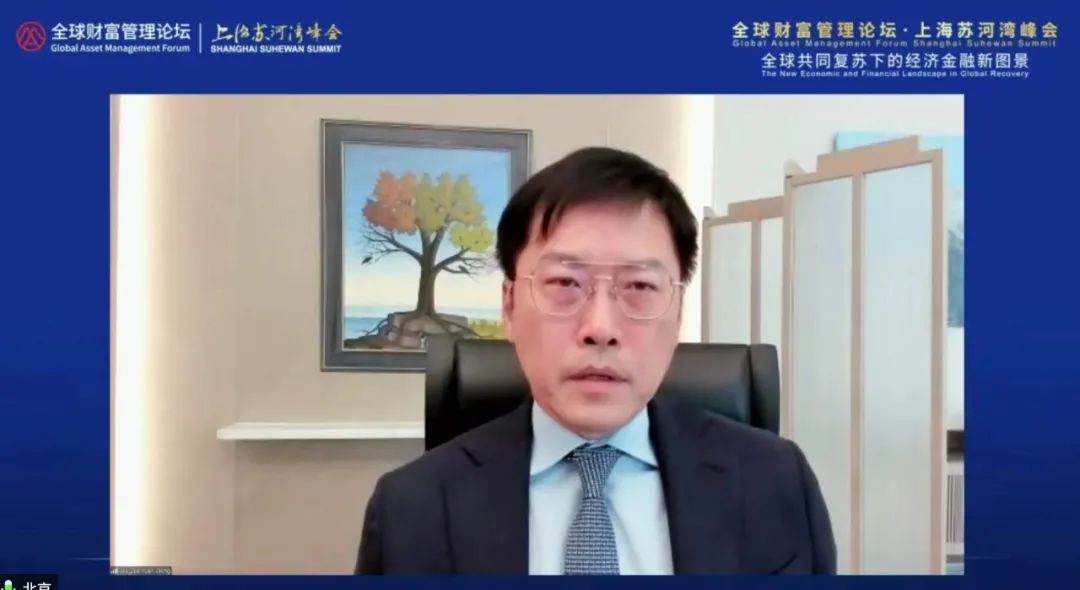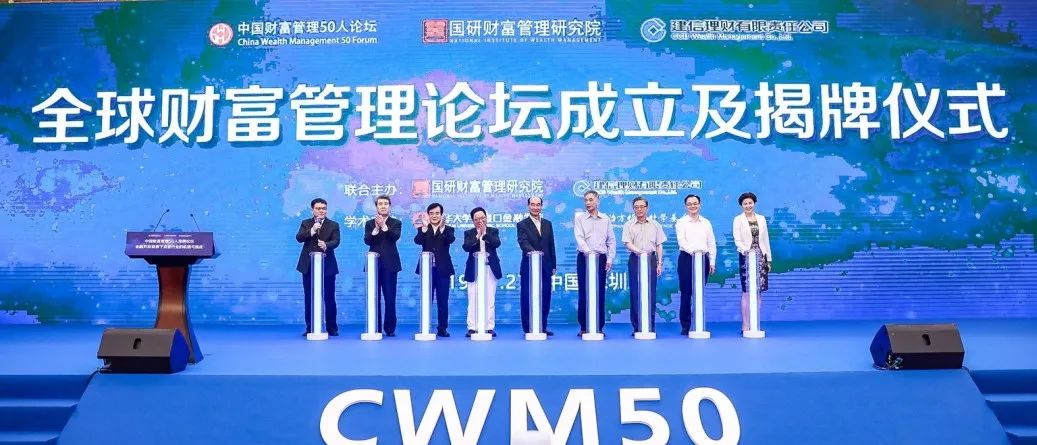友邦保险CEO李源祥:化挑战为契机,促进经济可持续发展

友邦保险集团CEO李源祥先生(Lee Yuan Siong)近日出席全球财富管理论坛上海苏河湾峰会时,以《全球经济金融合作中的机遇和挑战》为题进行演讲。
作为一家成立于上海、拥有百年市场积淀的老牌外资保险机构,李源祥先生首先富有温度地介绍了在错综复杂的全球形势下,友邦保险深耕亚洲、放眼全球的市场定位。李源祥先生以坚实的数据为支撑,明确指出从当前至未来相当长一段时间内,亚洲仍将是最重要的全球经济增长引擎。随着全球性挑战的日益严峻,李源祥先生从金融行业内外两方面给出了应对措施:对外,各国、各行业、各机构间应加强跨区域交流合作;对内,金融机构自身应持续改革,夯实内功,提高发展韧性。李源祥先生表示,虽然疫情以来全球各区域间的贫富差距在不断拉大,但若金融体系内部能够高效协同,当下的挑战反而会是一个开启全球长期深化合作、互利共赢的契机,所谓“逆全球化”也将自证其伪。同时,李源祥先生基于中国过去几年在促进实体经济发展、加快金融对外开放的实践,认识到“不谋全局者,不足谋一域”,倡导金融机构在盈利之外更要有诚信守业的社会担当。最后,李源祥先生就气候变化问题分享了友邦保险集团的经验,表达了保险行业在促进经济可持续发展方面可以发挥更加重要的作用。
以下为演讲全文。

全球经济金融合作中的机遇和挑战
李源祥
大约一个世纪以前,友邦保险成立于上海。目前,我们主要服务于亚洲,业务遍及区域内十八个国家及地区。回首百年发展历程,友邦保险在历史激荡中几经沉浮,亲眼见证并积极推动了亚洲经济与社会的成长。
作为最具活力的经济区域,亚洲为全球增长做出了不可磨灭的贡献。预计到2040年,全球GDP的一半以及消费的40%将由亚洲创造。如今,全球超三分之二的货物流经亚洲,三分之二的专利申请也来自亚洲。因此,对于在座的所有亚洲机构而言,我们应继续引领全球经济的互联互通:吸引更多国家进入全球市场和价值链、促进世界经济增长、促进发展中国家数百万人脱贫。中国市场近来在上述方面的表现尤为引人注目。
尽管解决经济增长和不平等问题主要还得依靠各国的国内政策,但现在面临的许多重大经济增长问题事实上已经超越国界,上升为全球性的课题。新冠疫情和气候变化是其中两个典型,另外还有贸易监管、偷逃税、数字安全到不平等的日益加剧等其他许多问题。这些都需要各国政府统筹协调才能成功应对,尤其是在深化经济金融普惠化方面加以引导。
自2020年初以来,新冠疫情造成了纷繁复杂的局面,引起了从政治、宏观经济到资本市场等领域前所未有的变化。人们曾对金融体系面对疫情时的脆弱性存在一定的担忧。不过,在过去十五年中,通过改革,金融机构已极大地提高了发展韧性,使其有能力承受更大规模甚至意料之外的冲击。通过这些年的多方合作与改革,金融机构得以继续支持实体经济发展,证实了夯实内功是银行、资产管理机构和保险业能更好地服务于经济与人民需求的根本。
自疫情爆发以来,全球金融环境维持高度宽松状态,主要经济体采取了前所未有的货币宽松、财政刺激和逆周期调节,以支持实体经济并稳定市场情绪。这些宽松政策的成功与否取决于实体经济的反馈是否积极、企业和家庭收入是否有所提升,以及财政困难是否有所缓解。而一个高效协同的金融体系,恰能在向全球经济传递政策信号方面发挥重要作用。
然而,疫情的长期反复并叠加防疫政策的区域性差异,加剧了商品生产上下游的挑战,形成供给短缺,进而严重影响了全球供应链。此外,疫情期间,各经济体内部的贫富差距进一步扩大。这不仅加大了控制疫情的难度,而且还可能损害社会凝聚力,阻碍经济复苏。据统计,占全球总人口五分之一且最贫穷的52个国家中,只有6%的人口接种了疫苗。另外,预计到2024年,除中国外的其余发展中经济体GDP增速预期将比疫情前下滑5.5%,而发达经济体的GDP增速将优于这个水平。这将进一步扩大全球收入差距。这都表明,由于不平等现象加剧,全球经济复苏并不均衡,公共部门债务将显著增长。其次,疫情还加剧了全球不断推高的通胀压力。最后,全球需求不断变化、商品和能源价格上涨、供应链中断,这都将对增长前景形成压力。
然而,全球经济相互依存是一个不争的事实。虽然目前面临着巨大的挑战,但是长期来看,机遇更大。通过合作的拓宽与深化,国际社会互利共赢、取长补短,全球金融体系韧性得以提升。尽管面临诸多挑战,多边及区域贸易协定仍在有效运行,帮助全球贸易在2021年创下历史新高,使制造业高度竞争的国家受益,并有助于大多数国家适应疫情造成的制约因素。
不久前,去全球化令人担忧;但现在,事情正在起变化。其实,在保护知识产权、降低市场准入门槛,尤其是改善全球贸易及ESG方面,我们还可以进行更广泛的合作。这得靠我们更加积极主动地开展全球性跨区域协作来实现。如果不恢复资本、贸易和服务的跨境流动,包括发展中国家在内的全球经济就无法复苏。
过去几年,中国在促进实体经济发展、加快金融服务业对外开放的改革广受好评。我深刻认识到,在促进资本高效跨境流动、将全球标准引入本土实践,以及优化营商环境方面,资产管理行业可发挥更为突出的作用,以审慎方式稳扎稳打,促进良性竞争,提升市场效率。外资机构除了通过资本配置而为其自身获利之外,还肩负着为社会树立诚信标杆的使命,正所谓“不谋全局者,不足谋一域”。这意味着金融机构要向社会中最弱势群体提供相关知识,比如投资技能、最佳资产配置方案以及高质量的援助和金融教育。
最后,也是当今世界最重要的焦点,就是气候变化问题。长期投资机构重视长远发展,因此,机构应充分运用其在业界的规模和影响力,助力应对气候变化,促进可持续投资。令我最为自豪的是,友邦保险最近成功完成了对煤炭开采和燃煤发电行业投资的剥离,并宣布了我们基于科学理论指导下的净零碳排放目标承诺。由此可见,保险行业可以在促进经济向可持续发展转型方面发挥更加重要的作用,通过公共部门和私营部门的合作以加快潜在绿色金融机遇的发展节奏。如此一来,供给将完美地与需求相匹配。
我们应更加努力,在未来,每个人都大有可为。但请时刻谨记,全球经济和金融体系的碎片化仍将是人类克服重大挑战所面临的最大风险。只有通过国际间统筹协调、更具包容性的全球治理合作、更频繁有效的多边对话,以及更加积极的地区合作,才能更快地实现世界经济的公平复苏。

Opportunities and Challenges
in Global Economic and Financial Cooperation
Lee Yuan Siong
AIA was founded in Shanghai more than a century ago and we now operate exclusively in Asia across 18 markets. Over our 100 years in Asia, we have operated through many periods of local economic and political uncertainty, to provide benefits to our economies and communities.
Asia has played a pivotal role as an engine for global connectivity. By 2040 the region will generate 50% of global GDP and 40% of global consumption. Today, more than two-thirds of all global goods flow through Asia and 2 out of 3 patents filed are Asian. Therefore, it is vital for all of us here in Asia to continue to lead global connectivity. Drawing more countries into global markets and value chains has produced economic growth around the world and lifted millions out of poverty in developing nations, with China being the most dramatic success story by far.
While domestic policy is the primary vehicle for addressing issues of economic growth and inequality, the global economy is now facing a number of major issues that go beyond national borders. The Covid pandemic and climate change are the two most prominent examples, but there are many others, from trade regulation to tax evasion, and digital security to rising inequality. Coordinating actions by governments are needed to respond successfully, especially when it comes to steering economic and financial matters onto a more inclusive path.
From early 2020, the COVID-19 pandemic has presented an ever-changing and complex operating environment, bringing unprecedented shifts in politics, macroeconomics and capital markets. Although there were early concerns regarding the fragility of the financial system in response to the pandemic, reforms over the last 15 years have resulted in institutions which are significantly more resilient, with the capacity to absorb large scale and unexpected shocks. The result of these years of cooperation and reform is that financial institutions have been able to continue to support the real economy, validating the vision that a more resilient banking, asset management and insurance industry is better placed to serve the needs of economies and people.
Since the outbreak of the pandemic, financial conditions around the world have been highly accommodative, major economies have reacted with unprecedented levels of monetary easing, fiscal stimulus, and counter-cyclical policies to support the real economy and stabilise sentiment. The success of these policies relies on the extent of the positive impact to the real economy, supporting businesses and household incomes and easing financial difficulties. A coordinated and efficient financial system plays an essential role in helping achieve this through the efficient transmission of policy actions and signals to the global economy.
At the same time, public health responses combined with a divergence in the durations of outbreaks and containment measures have led to production and distribution challenges, creating shortages that are heavily impacting global supply chains. Within economies there has been a widening disparity between the rich and the poor, which not only makes it more difficult to control the ongoing pandemic, but also risks damaging social cohesion, stalling the recovery. In the poorest 52 countries, home to a fifth of the world's people, only 6% of the population has been vaccinated. By 2024, developing economies excluding China will have fallen 5.5% below their pre-pandemic expected GDP growth, while advanced economies will have surpassed it, further intensifying the global income gap. As a result of widening inequality, global economic recovery has been uneven with significant increases in public sector indebtedness. This has also compounded rising inflationary pressures across the world, with shifting global demand, increasing commodity and energy prices, and supply chain disruptions, all weighing on growth prospects.
However, an irrefutable fact of global economic interdependence is that although the current challenges may seem great, the long-term opportunities are even greater. By deepening and broadening cooperation, the international community reinforces each other's strengths and enhances the resilience of the global financial system through mutual and shared success. Despite the many challenges, multilateral and regional trade agreements are still operating effectively, helping global trade to hit fresh all-time highs in 2021, benefiting countries with highly competitive manufacturing industries and helping most countries to adapt to constraints created by the pandemic.
Not that long ago, deglobalisation was a cause for concern, but the actual evolution remains encouraging. However, more can and should be done to protect intellectual property rights, reduce barriers to entry and, in particular, improve the environmental, social and governance (ESG) aspects of global trade. This can only be done through coordinated global efforts and more proactive regional cooperation. There can be no global recovery, including developing countries, without a recovery in the cross-border flow of capital, goods and services.
In China, the reforms undertaken over the last few years to accelerate the opening-up of the financial services industry for the benefit of the real economy, are greatly valued. It is clear to me that the asset management industry has an even more prominent role to play in facilitating efficient cross-border flows of capital and harmonising global standards and domestic practices, and creating a supportive environment to move forward in a prudent way which fosters healthy competition and market efficiency. However, foreign investors carry a responsibility that goes beyond mere capital deployment and encompasses a fiduciary duty that promotes the betterment of the industry as a whole. This means bringing technical know-how such as investment expertise, best-practices in asset allocation and delivering high-quality support and financial education to the most vulnerable members of society.
Nowhere is this more important than in the issue of climate change. Long-term investors appreciate the merits of investing in the future of society sustainably, hence have a responsibility to use their scale and influence in the investment community, to help respond to climate change and promote sustainable investing. At AIA, I am proud that we have recently completed our divestment from coal mining and coal-fired power sectors and announced our commitments to achieving net-zero greenhouse gas emissions in conjunction with the Science Based Targets Initiative. The industry can play a much more important role in facilitating the transition to sustainable economies, with collaboration between the public and private sector impacting the pace and development of potential green finance opportunities. This is a perfect combination of supply and demand.
I am certain that there is still much more we can do and a tremendous opportunity for all of us to make a difference. As ever, the most significant risk to surmounting the major challenges facing humanity remains the fragmented nature of global economic and financial systems. It is only through concerted international effort and even stronger collaboration on inclusive global governance, more effective and frequent multilateral dialogue, and more active regional cooperation that a balanced and equitable economic recovery can be delivered at pace.
全球财富管理论坛

全球财富管理论坛是在金融开放背景下,为顺应全球资产管理行业发展与中国资产管理行业转型需求,由清华大学经济管理学院、孙冶方经济科学基金会、中国财富管理50人论坛联合发起成立的一个国际性交流平台组织,论坛旨在构建一个汇聚全球资产拥有者和管理者、监管部门和市场代表的长期对话沟通平台,为国内外资产管理机构搭建交流与合作的桥梁。

